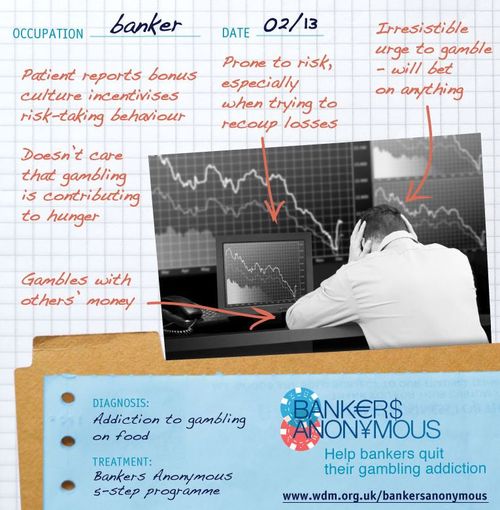
If you haven't seen it, there's a movement to stop banks gambling on food commodity prices.
It has been created by the World Development Movement, and they describe the campaign as follows:
Banks, hedge funds and pension funds are betting on food
prices in financial markets, causing drastic price swings in staple foods such
as wheat, maize and soy.
These markets were originally developed for the benefit of
those involved in the production of food, yet over the last 10 years they have
changed almost beyond recognition. Deregulation has enabled speculators to
dominate, causing drastic spikes and crashes in prices.
Effects of rising food prices
Massive food price increases are catastrophic for people in
poverty in the global south, who spend most of their income on food. This
results in:
- Increased
hunger as food becomes unaffordable. - Malnutrition
as smaller quantities of expensive foods such as fruit and vegetables are
eaten in order to afford staple foods - Increased
burden on women to earn more money by taking up risky employment such as
sex work or domestic work. - Households
using up savings, going into debt or selling assets to pay for food. - Families
unable to afford healthcare and education as more of their income is
needed to buy basic food.
In the last six months of 2010 alone, more than 44 million
people were driven into extreme poverty as a result of rising food prices. At
the same time, banks and financial investors are making a killing. We estimate
that Barclays makes up to £340 million a year from betting, or speculating, on
food prices. In the last five years, the amount of financial speculation on
food has nearly doubled, from $65 billion to $126 billion.
Our report, The great
hunger lottery explains food speculation and its impacts on the
world’s poorest people while our latest report, Broken markets provides a
more technical explanation of how financial speculation drives up food
prices.
They have created a petition to lobby banks and politicians to stop this commodity trading speculation, and Barclays bank are the first bank to publicly step up and support the change.
This is a massive change and achievement for the campaign, who only recently posted that:
Barclays Capital's
role in food speculation is driving up global food prices and leaving millions
facing hunger and malnutrition. Barclays is the UK’s biggest player in food
speculation and helps other financial players bet on hunger too.
Top UK player in
food speculation
- Barclays is the UK banking sector’s
market leader in food speculation and is the only UK bank that has any
real presence in commodities trading. RBS has sold off its commodities
division and HSBC is involved primarily in metal markets rather than food.
- Barclays' dominance in the commodities
market is widely recognised within the financial industry itself: winning
the Risk
Magazine Award for Commodity and Energy Derivatives House of the Year for
2008, 2009 and 2011.
- It is estimated that Barclays could be
making as much as £189
million a year from speculating on food. Barclays is also the
leading European player in oil speculation which is driving up oil prices.
Since oil is a key input in agricultural production, higher oil prices
means higher costs of production and therefore rising food prices.
New Barclays CEO announced on 12th February that this would stop:
Barclays announced an end to its speculation on food on
Tuesday, even though the bank made up to an estimated £278 million from the trade in 2012. The
figure brings the bank’s total revenue from food speculation from 2010 to 2012
to an estimated three quarters of a billion pounds.
The bank has pulled
out of speculative deals with hedge funds. Campaigners welcome this move but
are disappointed by its decision to continue selling investment products that
allow other financial players, like pension funds, to speculate.
The £278 million
figure was released today by the World Development Movement, which is calling
for regulation to prevent banks betting on food prices and contributing to the
global hunger crisis.
Barclays has been
the leading UK player in speculating on food. Goldman Sachs is widely
recognised as the world leader.
Barclays’ withdrawal
follows announcements in 2012 by several German, Austrian and Scandinavian
banks that they would reduce or suspend trading in food commodity markets. But
German giant Deutsche Bank, one of the banks indicating a withdrawal, has since
returned to speculating on food.
Legislation to curb
speculation is on the table at the EU, but the UK government has so far opposed
effective controls.
Interesting to see:
- How a social movement can change a bank's policies
- How a bank is resp0nding to the social need to change
On the latter point, it's all part of Barclays rehabilitation to shake off the Bob Diamond era and this move, along with others taken in February, mark that new CEO Antony Jenkins is serious about change.
Chris M Skinner
Chris Skinner is best known as an independent commentator on the financial markets through his blog, TheFinanser.com, as author of the bestselling book Digital Bank, and Chair of the European networking forum the Financial Services Club. He has been voted one of the most influential people in banking by The Financial Brand (as well as one of the best blogs), a FinTech Titan (Next Bank), one of the Fintech Leaders you need to follow (City AM, Deluxe and Jax Finance), as well as one of the Top 40 most influential people in financial technology by the Wall Street Journal's Financial News. To learn more click here...





















